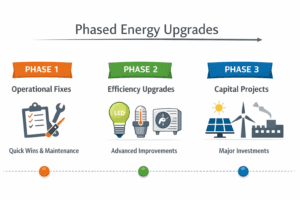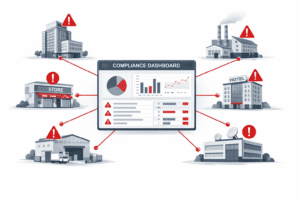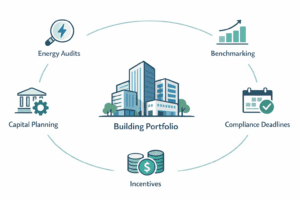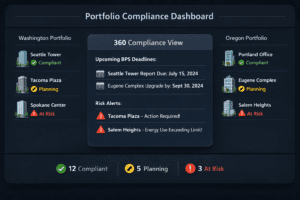In an ever-evolving real estate landscape, staying compliant isn’t merely a regulatory necessity but a strategic advantage. With the upcoming 2025 compliance deadlines focusing on energy efficiency, property owners are facing critical decisions that could significantly influence their operational efficiency and market positioning. This article delves deep into the “2025 energy compliance” requirements, outlines the “penalties for non-compliance,” discusses the importance of “building energy benchmarking,” and provides actionable advice to ensure readiness.
The 2025 Energy Compliance Deadline

The 2025 energy compliance regulations represent a concerted effort by government bodies to align property management with broader environmental sustainability goals. These regulations are geared towards reducing the overall energy consumption of buildings, thereby decreasing the carbon footprint of urban centers and contributing to the fight against global warming.
The specifics of these regulations may vary depending on local laws but generally include mandates on installing energy-efficient systems, improving building insulation, and utilizing renewable energy sources. The goal is to create a more sustainable infrastructure that not only benefits the environment but also reduces energy costs for property owners in the long run.
For property owners, understanding these requirements is crucial. Several resources are available, including government websites and industry guides, which break down these regulations by state and property type. Websites like Vertpro.com and Energy Star offer comprehensive guidelines and tools to help property owners meet these new standards.
Penalties for Non-compliance
The consequences of ignoring these impending regulations can be severe. Penalties for non-compliance vary widely but can include substantial fines that may impact the financial stability of your real estate operations. For instance, in some cities, continued non-compliance can also lead to a moratorium on any new building permits for the property, which could delay future development plans or improvements.
Furthermore, non-compliant properties may face operational restrictions or, in extreme cases, mandatory shutdowns until compliance is achieved. Such actions can tarnish a property’s market reputation and lead to significant revenue losses.
To understand the specific penalties applicable in different regions, property owners should consult local government websites, such as NYC’s Official Website or the San Francisco Building Department, which provide detailed information on the implications of non-compliance.
Building Energy Benchmarking
Energy benchmarking is the process of measuring a building’s energy use and comparing it to similar buildings. This process is crucial not only for meeting compliance requirements but also for identifying opportunities to enhance energy efficiency. Benchmarking can uncover potential savings by highlighting overuse and wastage, which can then be addressed through targeted improvements.
The U.S. Environmental Protection Agency’s ENERGY STAR Portfolio Manager is a popular tool for this purpose and is recognized by many local governments for compliance reporting. It allows property owners to track and assess energy and water consumption, as well as greenhouse gas emissions. Engaging in regular benchmarking using tools like ENERGY STAR Portfolio Manager can help property owners stay ahead of regulatory demands and manage utility costs effectively.
Why Act Now?
The reasons to start preparing now for the 2025 compliance are numerous:
– Financial Planning and Management: Early planning allows for the distribution of any needed investment over a longer period, which can ease the financial burden. It also opens up more opportunities for obtaining financing at competitive rates or securing government incentives.
– Enhanced Property Value: Properties that comply with stringent energy requirements often see an increase in their market value. Such properties attract a higher caliber of tenants and command premium rents, reflecting their lower operational costs and higher living standards.
– Corporate Responsibility and Branding: Demonstrating a commitment to sustainability can significantly enhance a brand’s reputation. This is increasingly important as consumers and businesses alike prefer to associate with environmentally responsible entities.
– Government Incentives: Many local governments offer incentives for early compliance, such as tax breaks, rebates, and grants. These incentives can substantially reduce the cost associated with upgrades and retrofits.
Getting Started

The first step in meeting 2025 compliance is conducting an energy audit of your properties. This will identify current performance and pinpoint areas that need improvement. Following this, property owners should consider engaging with energy consultants and sustainability experts who can provide guidance on effective compliance strategies.
Continuing education through workshops and industry seminars can also be incredibly beneficial. Organizations like Building Owners and Managers Association International often offer resources and training designed to help property owners navigate new regulations.
Conclusion
The 2025 energy compliance deadline is not just another regulatory milestone; it is a transformative shift in how properties are managed and valued. For property owners, proactive engagement with these requirements is essential. By doing so, they not only ensure compliance but also position their properties as leaders in sustainability, operational efficiency, and marketability. In real estate, being proactive doesn’t just mean keeping up with the competition; it means outpacing it, setting new standards, and reaping the financial rewards that come with being ahead of the curve.
VertPro.com serves as a resourceful platform for property owners and managers seeking to enhance their buildings’ energy efficiency. The site offers a range of services, including Commercial Energy Audits, Benchmark Compliance consultancy, and a Construction Marketplace. At the heart of VertPro® is a suite of SaaS technology-based solutions designed to assist in navigating the complexities of Energy Benchmarking and Energy Audits/RCx Plus, while ensuring adherence to over 60 Energy Benchmarking and Energy Efficiency Laws across the country.
For those looking to improve their property’s energy usage and operational value, VertPro.com provides a diverse array of tools and information. The site aims to facilitate a better understanding of energy efficiency practices and legislation, helping building owners and property managers make informed decisions about their energy strategies while complying with all energy ordinances and laws.















